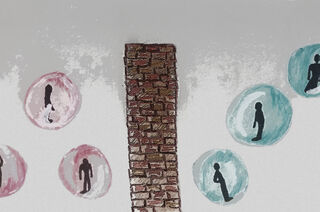Relationships
Civility Is Overrated
People are taught to be civil, but that may be producing harm in discourse.
Posted January 20, 2021

This post, which will focus on what might be going wrong with communication in this country (and, on a smaller scale, individually) developed from a discussion with Ohad Fedida, a student, who then co-wrote the post with me.
We are taught to be civil. For many, the thought of being anything but civil would be considered rude and out of line. When asked, people claim to be ready to engage in dialogue and see the other side. Yet, the country is repeatedly described as being extremely divided and near civil war. Both social empathy (Seppälä, 2019) and trust (Vallier, 2020) are on the decline. Bumper stickers, banners, and tee shirts abound which insult the other side. Social media “friends” are discarded for holding opposing beliefs. One side seems to feel the other is communist, while the other accuses their opponents of being fascist.
In relation to this, with both sides in fear of the other and preparing for attack (Glass, 2020. 45:43), gun sales are reported to be at a record high (Glass, 2020. 23:55), with shops reporting to be running low or totally out of bullets (Glass, 2020. 26:16-26:36), In a recent podcast (Vedantam, 2020), experiments were heralded as demonstrating the divide in this country: People of a particular political affiliation would not want their offspring marrying someone of the opposing party. In a modified version of the experiment, the researchers came to the conclusion that most think it would be fine if their offspring married someone of the opposing party, as long as politics weren’t discussed. Perhaps herein lies the problem: We are divided, and if we can’t discuss it civilly, we won’t discuss it at all. Is there anything we can do to improve this predicament?
We Are Taught to Be Civil
In order to suggest alternate paths forward, it would be useful and necessary to identify what conceptions are clearly failing us. From childhood through much of one’s development, people are taught to be nice or polite; in short, taught to always be civil. Civility involves seeing how we are similar and sticking to those things which are shared. People claim to desire peace and are taught that the solution to societal breakdown involves talking calmly with each other. This view ultimately manifests in a large campfire where everyone holds hands and sings together. It is assumed that when people raise their voices it is inappropriate.
On a deeper note, current conceptions of dialogue assume that beliefs and positions are all consciously constructed. It is assumed that everyone has the same perspective as one does, and when this is not the case, the other just needs to be shown the folly of his or her ways.
“What's interesting about both groups here is that there is a very powerful illusion that we have that the rest of the world sees the world the way that we see the world. And if they come to a different conclusion, it must be because they're being deliberately obtuse or somehow deliberately biased...” (Vedantam, 2019). As Kathryn Schulz has demonstrated, there are three phases one experiences when in conflict: The first is believing the other is mistaken and providing more information. If that doesn’t help, the individual is thought stupid. If one determines the other is not stupid, their disagreement is perceived as malicious (Schulz, K; 2011). This extends throughout all our relationships—not just political interactions.
How This Is False
Although elements of the notion presented above have truth to them and are important, they are clearly not holding up. Fostering the skill to engage calmly is important but is not enough. Talking calmly alone does not lead to constructive dialogue and ultimately to the harmony of society. Calm quiet does not necessarily indicate peace and can actually be an indication of apathy. The healthiest forms of love involve honestly working through serious issues. When one is working through serious issues, emotions may run high, and offense is possible, perhaps even likely, as the brain senses threat and the mind becomes defensive. As stated by Dr. Jordan Peterson in an interview, “You can't say anything about anything important ever without offending...important speech about important issues, specifically about contentious issues, is instantly offensive" (ABC News In-depth, 2018).
However, not working through these issues is worse. Conflict in close relationships is normal, and should not be avoided. Conflict avoidance can actually become pathological and lead to behaviors detrimental to any relationship and society (eg. passive aggression, stonewalling). Again, handling things appropriately with respect for all concerned is of the utmost importance, but believing that everyone must remain calm at all times, never raise their voice, or otherwise be passionate about a topic, is to foster conflict avoidance.
Generally, when we claim to desire civil discussion, we are really desiring to calmly explain to the other how they are wrong. Being civil yet dismissive while not seeing any way others could have come to their position as rational beings is not an appropriate nor successful strategy.
Fundamentally, the issue with all this lies in our conception of our differences being limited to, and produced by, conscious cognition. Yet this is false. Most of our perspectives develop as a result of our personalities and temperaments, which are further influenced by evolutionary needs. People are unconsciously influenced by so many factors yet trust the lies the brain sells them as explanation (for more on this, see my post “The Human, Lion, and Multi-Headed Beast Inside”).
As expressed by Dr. John Hibbing, “our political beliefs are part and parcel of our entire being...it's not like they're completely separate. And it's just a natural outgrowth of these larger psychological and even physiological tendencies…” (Vedantam, 2019). Our political affiliations empirically correlate to traits such as conscientiousness and openness, to what foods we prefer, pets we have, and clothing we wear! Just as being orderly or agreeable temperamentally is not a matter of right or wrong, so too our political, and personal perspectives may not be a matter of right or wrong.
Solution & New Perspective
Where does all this lead us to? Life is brutal and complex with very few things being a black/white, right/wrong issue. Despite believing that the world would function more effectively if everyone came to the same conclusion, this is in fact inaccurate. Humans, and societies, function better with intellectual and temperamental diversity which ultimately leads to disagreement. The mind itself is made up of different factions (I am sure you can relate to arguing with yourself about a course of action) and the best functioning societies are as well. We need conflict, and we need each other.
Being that society is composed of individuals, if society as a whole is moving in a certain direction, it is we, the individuals, who are moving it there. As such, it would follow that if we are seeing our society lose its empathy, trust, and discourse, it is also we who are not open to it.
If we are interested in solutions we must be open to change our mode of interaction within ourselves and outwardly with others. As suggested in this essay, breakdowns do not occur due to a lack of civility (alone) but rather more so as not being able to see the value in others. It is a lack of seeing the other as having something of importance to bring to the table. It is a lack in controlling our evolutionary tendency to dismiss the other as irrational or malicious -—regardless of how civil of a manner one has when doing this.
The solution is to be less convinced of one’s own position, and perhaps most importantly to understand that we need each other to provide a system of checks and balances. One party political systems have not worked, as clearly seen throughout history, nor one-sided relationships that reflect abuse or delusion. Debate, within the context of seeing the other as a necessary part of the whole, is essential to the functioning of a society and fundamental to our personal relationships. All good and productive debate cannot be risk-free of someone feeling offended.
Perhaps, as Jonathan Haidt suggests, we need to work to be less offensive, as well as to be less offended (Shepard, 2018). Perhaps we can be more like the University of Chicago’s Dean of Students who said: “Our commitment to academic freedom means that we do not support so-called trigger warnings, we do not cancel invited speakers because their topics might prove controversial, and we do not condone the creation of intellectual ‘safe spaces’ where individuals can retreat from ideas and perspectives at odds with their own.” Haidt believes we have created a culture that has become too politically correct, too protective, and, perhaps, too fragile. The solution is allowing discourse, becoming less offensive and less easily offended. In short, allowing some incivility, within the context of deep value of the other, for it is only then that we are able to optimally function as a society and personally.
Copyright William Berry, Ohad Fedida, 2021
References
ABC News In-depth. (2018, March 12). Jordan Peterson on taking responsibility for your life | 7.30. https://www.youtube.com/watch?v=1biDxaT0ED4
Glass, I., 2020. The Gun Reality of Now. From the podcast This American Life, episode 722: The Unreality of Now, from 23:51 to 45:43. Retrieved from: https://www.thisamericanlife.org/722/the-unreality-of-now/act-two-18
Schulz, K., 2011. On Being Wrong; TED Talk; http://www.ted.com/talks/kathryn_schulz_on_being_wrong
Seppälä, E. 2019. Empathy is on the decline in this country: A new book describes what we can do to bring it back. The Washington Post. Retrieved from: https://www.washingtonpost.com/lifestyle/2019/06/11/empathy-is-decline-…
Shepard, D. 2018. Expert on Expert: Jonathan Haidt. From the podcast, Armchair Expert. https://armchairexpertpod.com/pods/jonathan-haidt
Vallier, K. 2020. Why are Americans so distrustful of each other? The Wall Street Journal. Retrieved from: https://www.wsj.com/articles/why-are-americans-so-distrustful-of-each-o…
Vedantam, S., 2019. More Divided than Ever? From the podcast Hidden Brain. Retrieved from https://www.npr.org/2019/05/20/724999235/more-divided-than-ever-excavat…
Vedantam S., 2020. Not at the Dinner Table. From the podcast, Hidden Brain. Retrieved from: Transcript of Not at the Dinner Table from Hidden Brain podcastwww.happyscribe.com › public › not-at-the-dinner-tableTranscript of Not at the Dinner Table from Hidden Brain podcastwww.happyscribe.com › public › not-at-the-dinner-table




